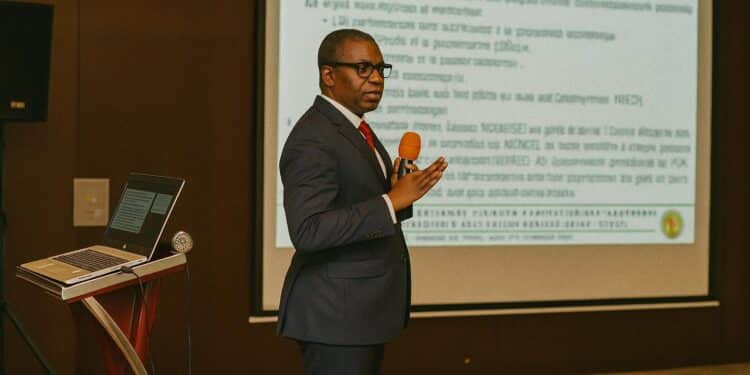A discreet working lunch with weighty implications
When the members of Congo-Brazzaville’s National Commission for the African Peer Review Mechanism gathered at Brazzaville’s Grand Lancaster Hotel on 17 July 2025, the ambience was cordial, yet unmistakably purposeful. Presiding over the working lunch, Commission Chair Alain Akouala-Atipault reminded the newly invested cohort that their remit stretches well beyond drafting reports: it entails ensuring that state policies align with the political, economic and corporate governance standards enshrined in the APRM Declaration (African Union, 2003). In diplomatic circles the moment was read as a calibrated signal that Brazzaville intends to engage the continental review in earnest, rather than treat it as a ceremonial exercise.
From Lagos to Agenda 2063: a continental continuity
Akouala-Atipault located the Commission’s mandate in a long intellectual lineage. He cited the 1980 Lagos Plan of Action, the anti-apartheid solidarity fund launched under President Denis Sassou Nguesso’s leadership of the then OAU in the late 1980s, and the 1990 La Baule conference that reframed international support for African governance reforms. He then traced a straight line to NEPAD in 2001 and to Agenda 2063, capturing the African Union’s determination to couple sovereignty with measurable governance progress (NEPAD Secretariat, 2001; African Union Commission, 2015). In doing so, the chair positioned the APRM not as a foreign-imposed metric but as the latest chapter in Africa’s own search for credible institutional self-scrutiny.
The APRM toolkit: voluntary, rigorous and politically reassuring
Created in 2003, the APRM rests on three deceptively simple pillars: voluntary accession, peer evaluation and corrective action plans. Each country submits a self-assessment, after which a panel of eminent persons validates the data before heads of state deliberate. The Economic Commission for Africa has repeatedly underscored that ‘credibility hinges on unvarnished statistics and inclusive consultations’ (UNECA Policy Brief, 2022). For Brazzaville, which joined the mechanism soon after its inception, the exercise offers an additional diplomatic dividend: substantiating its stability narrative to investors and multilateral lenders without resorting to public relations campaigns.
Domestic assets and the quest for inter-institutional synergy
Contrary to sceptics’ perceptions, the Republic of the Congo is not starting from a blank slate. The Supreme Audit Institution, the Anti-Corruption Observatory and parliamentary committees already generate datasets on public finance, procurement and corporate compliance. By weaving these strands into a comprehensive peer-review dossier, the Commission hopes to minimise redundant field missions and accelerate submission deadlines. Commission member Florence Ndinga, a constitutional scholar, noted during the lunch that ‘the art lies in coordinating, not duplicating, oversight’. Her remark captured the pragmatic mood prevailing among participants.
A skyscraper dilemma: symbolism meets practicality
If governance metrics dominate the conceptual debate, physical logistics still matter. The Commission currently occupies the sixteenth floor of the iconic Nabemba Tower, a Brazzaville landmark better known for panoramic views than for archival space. Confidential interviews with staff suggest that limited meeting rooms and intermittent connectivity could hamper the lengthy stakeholder consultations envisaged by APRM guidelines. Government officials present at the luncheon acknowledged the constraint and hinted that alternative premises are under review. While no timeline was disclosed, the readiness to address such mundane yet critical details underscored official resolve.
Regional stakes and calibrated expectations
Across the continent, forty-four states have acceded to the APRM, and twenty-nine have completed at least one full review. Analysts at the Institute for Security Studies argue that peer-review findings increasingly inform AfCFTA negotiations and credit-rating outlooks (ISS Commentary, 2024). For Congo-Brazzaville, a well-documented report could therefore translate into tangible trade advantages, particularly in energy-related supply chains where governance assurances weigh heavily on project finance. Yet officials are careful to modulate expectations, emphasising that the primary audience remains domestic: civil servants, legislators and citizens who stand to benefit from streamlined institutions.
Quiet momentum toward a transparent appraisal
In the closing minutes of the lunch, Akouala-Atipault summarised the immediate roadmap: finalise thematic sub-committees, collate baseline data by December and launch nationwide consultations early next year. The atmosphere, participants said, was neither triumphalist nor defensive but quietly confident. That tonal balance mirrors Brazzaville’s broader diplomatic posture: assertive about its sovereignty, attentive to continental norms and pragmatic about the hard administrative work that genuine peer review entails.
Whether the Commission will meet its ambitious deadlines will depend on sustained budgetary support and the successful relocation to a purpose-built headquarters. Still, the political will displayed so far, coupled with President Denis Sassou Nguesso’s historic engagement with continental integration, suggests that Congo-Brazzaville is positioning itself not merely to comply with the APRM but to leverage it as a springboard for calibrated reforms. In an era where governance narratives often oscillate between scepticism and hyperbole, such quiet momentum may prove to be the most persuasive diplomatic statement of all.











































